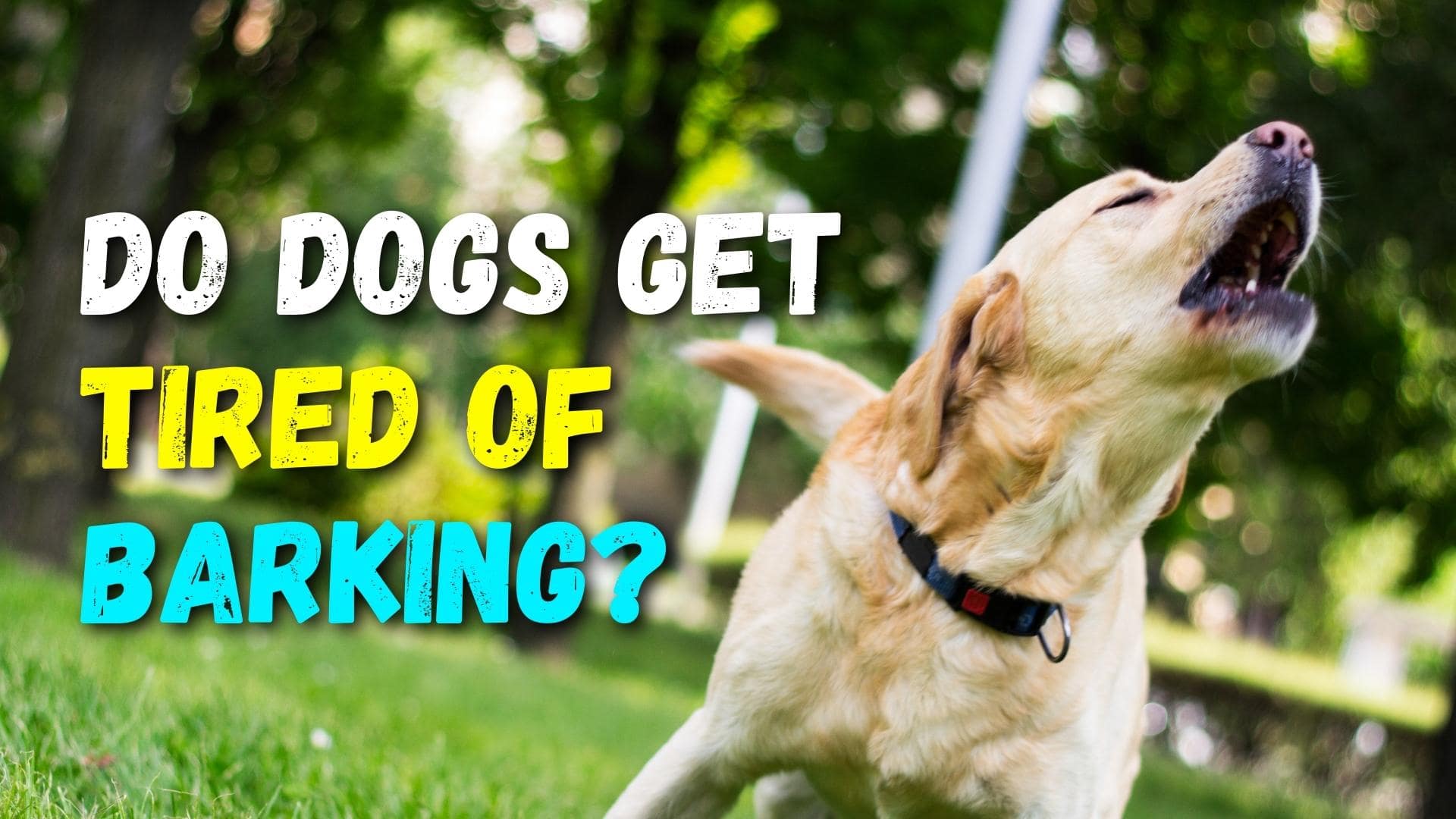Pawscessories is reader-supported. When you buy via links on our site, we may earn an affiliate commission at no cost to you.
Learn more.
How much do you love your dog? If you’re like most people, the answer is a lot. Dogs are people’s best friends for a reason! But sometimes, our furry friends can drive us crazy with their incessant barking.
Do dogs get tired of barking? Why do they do it in the first place? And how can we stop it?
No, dogs do not get tired of barking. In fact, they can bark for hours until they get the response they want. Dogs may become physically tired after some time, which could reduce their barking but the desire to bark remains. Common reasons for dog barking include boredom, habit, and communication.
In this blog post, we’ll explore why dogs don’t get tired of barking, the 11 reasons a dog will bark, and what you can do to stop excessive barking.
Let’s dive in.
Table of Contents

Do Dogs Get Tired of Barking?
In short, no, dogs don’t get tired of barking.
Barking is a dog’s way of communicating, and they will continue to do so until the message they are trying to get across is received. For example, a dog may bark when they are hungry or want to go outside.
They will likely continue to bark until their request is answered. Once they get what they want, barking usually subsides for the time being.
However, a dog may become physically tired after extended periods of barking, but the desire to bark likely remains. This is because barking serves an essential purpose for dogs and is often a go-to communication for many.
Barking can happen for a variety of reasons, and in order to stop excessive barking, dog owners need to determine why their dog is barking. Once dog owners know why a dog is barking, only then can they work to reduce excessive barking.
Unfortunately, it’s not so simple, though. Dogs cannot tell us exactly what is bothering them or what they need. So we need to use our best judgment to try and figure it out.
Why Do Dogs Bark Excessively?

Dogs may bark for a variety of reasons. Here are the 11 most common reasons a dog will bark:
Attention-Seeking Barking
Attention-seeking barking is when a dog is looking to get your attention or a reward of some sort. This is sometimes called ‘Demand Barking’, where your dog demands you play with them and give them attention.
Greeting & Excitement Barking

Greeting and excitement barking is when a dog is overstimulated and basically saying hello. This is not an aggressive bark, a dog’s tail is wagging, and you can tell they are a happy doggo.
The majority of the time, these vocal expressions are also higher pitched. So when your dog gets excited, you are home or during playtime with you or other dogs, and they let out a few barks here and there, it’s usually excitement barking.
Fear & Reactive Barking
When dogs are fearful or overly reactive, they can become defensive. This often leads to aggressive barking. This usually stems from a place of fear. Fear-based reactive barking may develop when puppies are not adequately socialized during their early years.
In addition, this barking can develop after dogs experience something traumatic.
Self-Reinforcing Habit

This form of barking is one of the most difficult to deal with. It can develop over time when owners are away from the house or when barking is not properly corrected from a young age.
Once the barking starts, it can quickly become a self-reinforcing habit that is challenging to break.
Here is a perfect example: your dog barks outside the window at people walking by. Their goal with this barking is likely to make those people leave the property, and guess what usually happens after they?
The person walks away. Not because of the dog barking, but because they were just walking by. However, your dog will not know this; they will think that because they barked, the person left. Thus, reinforcing their behavior to continue barking when people walk.
The more your dog barks and the outcome they were hoping for happens, the more the barking becomes reinforced.
Boredom & Loneliness
Boredom barking happens when a dog is under-stimulated and downright bored. With this barking, you may have no idea it’s happening until you are out of the house one day and your neighbors call complaining about your dogs barking.
Many dogs who get bored to this extent can often bark for hours if not addressed.
Protective & Territorial Barking

Territorial barking is a response to an intruder, be it people or animals. If something gets close to their food, yard, or human, they will let everyone know.
Dogs will also do this if they sense their family is in danger. If you have ever seen a dog become protective over their person when someone new approaches, this is what is happening.
Dogs see their people as part of their pack and will do whatever is necessary to protect them. Remember, dogs are the ancestors of wolves, and wolves are territorial. If you are an animal and wander into a wolf’s territory, you are not leaving alive. Dogs today have been domesticated, but they still have natural instincts.
Howling

Although howling sounds much different from barking, excessive howling is often the result of the same causes.
If your dog tends to howl at sirens or music, it might be hard to identify exactly why they are howling.
However, howling is similar to barking because it’s a dog’s attempt at communicating. Therefore, when your dog is howling, pay attention to their body language and why they might be howling. This can help you identify what they might be telling you.
Alarm Barking
Dogs will also bark when relaying information to their family. This is what we call alarm barking.
With alarm barking, your dog is letting you know “there is something there!” They may or may not be territorial or aggressive toward what they see or hear. They are just giving you a heads up.
These dogs can be on high alert, and the slightest noises can set them off. The big issue here is when dogs do this with everything.
Separation Anxiety
Some dogs bark as a response to separation anxiety. This can cause dogs to bark excessively, pace, have accidents inside, and become destructive.
This is one of the hardest behaviors to change in a dog because it’s usually something that has developed over time. Dogs with separation anxiety often become anxious when their owner starts to leave or is about to leave.
This can often be due to a traumatic event such as being abandoned, rehomed,
Injury or Pain

If your dog is suddenly barking more than usual, it could signify that they are injured or in pain. This reason for barking is usually noticeable, and you can tell something’s off.
Dogs will often bark when they are hurt as a way to communicate that something is wrong. If you notice your dog is barking more than normal and acting differently, take them to the vet to rule out any injuries or pain.
Frustration Barking
On the other hand, frustration barking can be misconstrued as demand barking. For example, if they want your attention and to play, but you are not giving them what they want, their attention-seeking bark can turn into frustration.
Another reason dogs will have frustration barking is when they get older. Senior dogs don’t move the ways they did when they were younger. Instead of being able to walk up to the door to indicate they need out, instead, they may bark while lying down.
Furthermore, older dogs that experience doggy dementia and other forms of cognitive degeneration may bark for no apparent reason.
Do Some Dogs Bark More Than Others?
Size, age, environment, and breed influence how much a dog barks.
For example, small breeds like Chihuahuas and Yorkshire Terriers are known for being yappy dogs. They will often bark at anything that moves!
On the other hand, large breeds such as Mastiffs and Great Danes are less likely to bark. But this doesn’t mean they never will; any dog can bark when they feel the need to.
Here is a list of dogs that tend to bark the most:
- Poodles
- Chihuahuas
- Miniature Schnauzers
- Yorkshire Terriers
- Cairn Terriers
- Fox Terriers
- Dachshunds
- Beagles
- Shih Tzus
- Maltese
- Pomeranians
Here is a list of dogs that bark the least:
In addition, older dogs may start to bark more as they experience doggy dementia and other forms of cognitive decline. Even without any health issues causing more barking, older dogs tend to bark more due to frustration barking.
Old dogs can get frustrated when they cannot move like they used to. So, they will communicate by barking instead of hitting the door to be let out. Their physical bodies are weaker, so they may rely on barking to communicate.
Lastly, an example of an environment affecting doggy barking is dogs that are left alone for long periods. These dogs can bark more from boredom or loneliness.
How Can You Stop Your Dog From Barking? (7 Steps)

I want to emphasize that changing your dog’s bad barking habits takes time, patience, and consistency. You must be dedicated to making these changes and making a regular effort to eliminate the behavior.
The time it will take to stop your dog’s barking depends on how long they have had this habit and how firmly entrenched the behavior is in your dog.
It is much easier to train a dog to stop barking that’s only had the bad habit for 6 months versus one that’s been doing it for 3 years.
Here are some steps you can take to
1.) Know What Not To Do
Never yell or shout at your dog when they are barking. This will only worsen the problem and cause your dog to bark more.
This is equivalent to yelling at someone for speaking. In addition, your dog has no idea what you are saying; they could easily think your yelling is like you “barking” with them.
Instead, you want to be calm, cool, and collected. Dogs feed off of our energy so how you want them to behave is how you need to act.
If you are calm, they will be calm. However, if you get excited and start barking back or telling them to “shut up,” they will think this is a game and get even more worked up than before.
2.) Identify The Problem
The first step in modifying dog behavior is identifying the root cause. When you know the root issue, you can design a plan around desensitizing them and adjusting the behavior.
Why is your dog barking? First, look through all the reasons a dog may bark and then identify why your dog is barking.
Note: A dog can bark for multiple reasons. In fact, it’s rarely just one reason.
If you can identify why they are barking, only then can you work to fix the problem.
3.) Reduce The Triggers

Once you can identify why a dog is barking, you can work to reduce their triggers. For example, suppose your dog is barking for attention. In that case, the best solution is to ignore their barking and only give them attention when they are not barking.
This means not speaking to them, not making eye contact, and not touching them until they are quiet. Once they are quiet, then you can pet them or give them a treat.
If your dog is barking because they are anxious, it is best to provide calm reassurance. This means speaking softly and possibly offering them a calming supplement.
Regardless of what might trigger their barking, your goal is to reduce their triggers.
5.) Teach Incompatible Behaviors
Now that you know what is causing your dog to bark and you have reduced their triggers, it’s time to start teaching them an incompatible behavior.
This is a behavior that they cannot do while also barking. For example, if your dog barks when they want attention, you can teach the “quiet” command. When your dog’s quiet, you can then provide them with attention. This could be petting them, giving them a treat, or simply praising them.
Another example would be teaching your dog to go to their bed and lay down whenever someone comes to the door. If your dog usually barks at new visitors, this behavior is incompatible with barking.
There are many different incompatible behaviors you can teach your dog. It just depends on what is causing their excessive barking in the first place.
Remember, you want to offer them attention or rewards when they display the new behavior, not when they are barking.
Teaching your dog an incompatible behavior is one of the most effective ways to stop excessive barking.
6.) Consistent Exercise & Stimulation
One common reason for excessive barking is boredom or lack of exercise. Dogs that are cooped up with nothing to do often bark as a way to release built-up energy.
Proper exercise and stimulation can be a great way to release this energy and can help reduce barking in dogs.
The best way to combat this is to ensure your dog gets plenty of exercise and stimulation. This could mean taking long walks, playing fetch in the backyard, or enrolling them in a dog sports class.
Whatever you do, ensure they get plenty of physical and mental exercise every day.
7.) Socialization
Another great way to reduce excessive barking is through socialization and training. Dogs that are properly socialized and trained are less likely to bark excessively.
This is because they have learned to behave around people and other dogs and know what is expected of them.
Proper socialization means exposing your dog to different people, places, and situations in a positive way so they can learn to cope with new environments. Proper training means teaching your dog basic obedience commands like sit, stay, come, down, etc.
Both Socialization and training can help reduce excessive barking by giving your dog the tools they need to cope with new situations, people, and animals.
8.) Manage environment

Another way to reduce excessive barking is by managing your dog’s environment and expectations. This means setting up your home to limit your dog’s ability to bark excessively.
For example, if your dog barks when they see people outside, you can block their view of the windows or keep them in a room away from the door. If your dog barks when left alone, you can provide them with a puzzle toy that will keep them busy or crate train them, so they have a safe space to go to when you’re not home.
There are many different ways you can manage your dog’s environment. It just depends on what is triggering their excessive barking. This also helps reduce a dog’s ability to reinforce their own barking.
Managing your dog’s environment is a great way to reduce their triggers and help them feel more comfortable around them.
7.) Get Professional Help
Sometimes, a dog’s barking habit can be too much for an owner to handle on their own. If you have tried all the above tips and your dog is still excessively barking, you may need professional help.
A behaviorist or trainer can work with you and your dog to help them learn how to cope with their triggers and stop excessive barking.
Other Frequently Asked Questions
Will Muzzles Stop Barking?
Muzzles can prevent barking, but they will not fix the behavior. Muzzles will make barking less comfortable and may help some dogs stay calmer. However, muzzles should not be used to stop barking. Muzzles that stop barking will also prevent panting, which is your dog’s main method for dispersing heat.
Dog Dogs Outgrow Barking?
Dogs will not outgrow barking. In fact, most bark more as they age. This is due to many things such as doggy dementia, frustration barking, and boredom. Older dogs cant move like they used to, so they may start to bark more as their main way of communication.
What Is A Normal Level Of Dog Barking?
There is no set answer for this question since all dogs bark differently. For example, some dogs may only bark when excited or happy. In contrast, others may bark at any given opportunity. If your dog is barking excessively, it may be time to reevaluate their behavior.
In short, a dog should only be barking to communicate information. However, when it becomes excessive to the point where they bark at anything and everything, it can become a problem. If you are concerned about your dog’s barking, consult a veterinarian or animal behaviorist to get help.
Other posts you might find interesting:
What To Do When Your Dog Barks In Their Crate At Night
7 Secrets To Stop Leash Pulling In Just 10 Minutes Per Day
